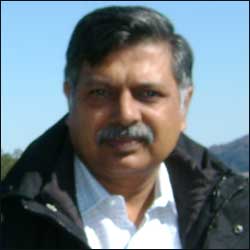There are IFAs who have served in the army. Rarer is a full-fledged medical doctor who is an IFA. But rarest is the doctor who was in the army and is now an IFA. Meet Dr. (Col.) Kamal K Goel, Executive Director, Unique Health & Wealth Consultants Pvt. Ltd. Delhi
 Tell us something about yourself?
Tell us something about yourself?
I joined the Army in 1972 and did medicine (MBBS) in 1971, from Maulana Azad Medical College, New Delhi, MS (Surgery) from AFMC PUNE, and MS (Orthopedics) from Gwalior. I served in the Army for 25years.
What motivated you to turn to financial planning?
I have always had an interest in financial matters. In fact I used to help out my colleagues and friends in filing returns, tax-saving investments much before I turned in to a financial planner.
I left the army in 1997. As a doctor, I have often seen families caught ill-prepared in financial terms to deal with medical contingencies. Very often families wipe out their hard-earned life-long savings to ensure quality treatment. Or else they have to compromise on the quality of treatment. I wanted to help and thought what better way than to advice people on financial matters and enabling them to make better choices.
I started Financial Planning in 2000 with a few relatives and friends as my ‘clients’. Today, I devote more than 50% of my time to financial planning. Medicine is my profession, financial planning is my passion.
How did you acquire the knowledge about financial planning?
Initially, I was self-taught, relying on books and magazines. When the Certified Financial Planner course was launched, I became one of the earliest people to become a Certified Financial Planner.
For me, learning is a continuous process. I try to update myself continuously, learning new concepts and new things. So much so, I have now started conducting my own classes in equities and derivatives.
Dr. Goel, you have spent 25 years in the army. How are the needs of the people in armed forces different from others?
Our soldiers are ready to take risk with their lives but not with their money. Mutual funds and equities are less popular with them. This is in spite of the fact that their ability to save is more relative to their income. Firstly, expenses tend to be low because very often their posting is in remote areas where there are limited avenues of spending. Also, army rations and supplies through CSD enable one to save more.
A favourite choice with them is the Defense Services Officers Provident Fund Account (DSOPFA) which works on the same lines as Employees Provident Fund (EPF).
However, in these inflationary times, that alone may not be enough. I have seen that though the first few years after retirement are good, financial problems do crop up later. I am now talking to the Army to allow us to conduct investor awareness education.
The challenge for IFAs wanting to do business with army men is that they need to create confidence in them about investments. Also servicing them is another challenge as there are frequent transfers.
Another group of people you have been a part of is the doctors. As investors, how are their needs unique?
Successful doctors ironically do not have the time to enjoy their money. It’s their children who enjoy the fruits. Also, their busy schedule leaves them with little time to learn about investments and finance. That is perhaps one reason why doctors tend to be more sensitive about discussing money with anyone.
IFAs wishing to build their practice among doctors would do well to focus on creating comfort and confidence among doctors. One credible way to do this is by participating in medical conferences and speaking on such platforms. Avoid using financial jargon completely at the initial stage. Instead, focus on building relationships.
Doctor, you do not ask your clients for a fee….
Currently, 20% of my clients are paying me a fee without my asking. They clearly see the value in what I do for them. In future, I expect more people to recognize this value and pay. I am confident that with time, all my clients will see the merit of what I do for them and pay me.
Going ahead, what are your plans?
I plan to hire two financial planners, each of them leading a core team to service a set of clients. Investment related education is another area I want to focus on. As I mentioned earlier, I am already taking classes in equities and derivatives. I want to grow and become a public limited company in 5 years!
Finally, your advice to budding IFAs?
Be sincere and honest with your clients. Think of their growth and your growth will automatically follow.





